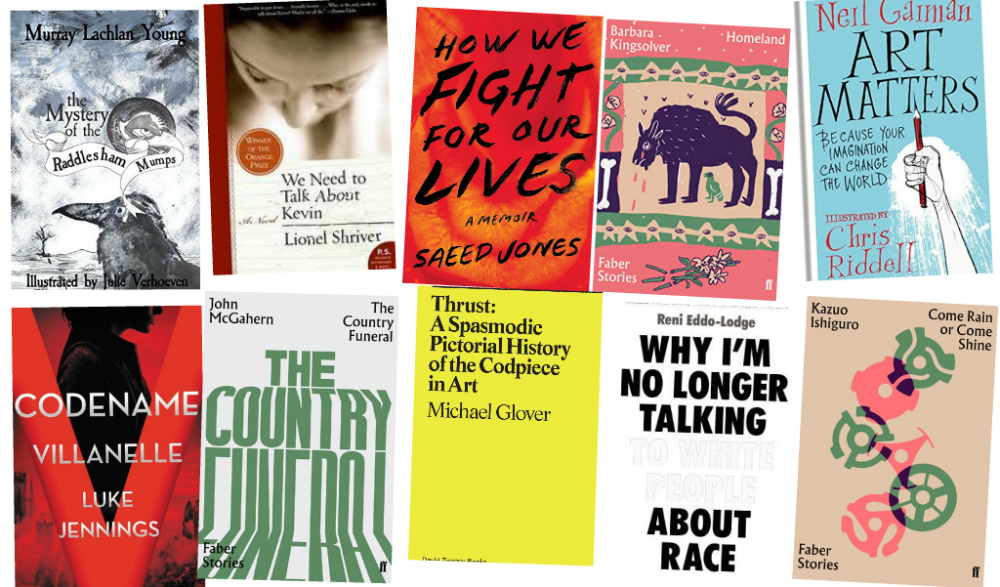What I’ve been reading this month

It feels like Neil Gaiman is having a bit of a career ‘moment’, with his work seemingly everywhere at the moment. Art Matters was a very short book of Gaiman quotations illustrated by Chris Riddell making a convincing argument about the importance of creativity in life. I was surprised to find myself feeling a little moved by this book. The subject matter wasn’t classically emotional, but the passion and power of the argument, particularly with respect to the importance of reading, caught me by surprise—especially for such a short book.
How We Fight For Our Lives was a solid and deeply personal memoir which gave me new insight in what it was like to grow up as a gay black man in the USA. Saeed Jones is the same age as me, but we’ve evidently lived very different lives, and I enjoyed reading a different perspective on modern life.
In Thrust: A Spasmodic Pictorial History of the Codpiece in Art Michael Glover explored the history of the codpiece, from its first appearance as a functional garment bridging the top of two stockings for men, through its brief (ridiculous) celebration as a fashion item, to its sudden demise in all but sporting contexts (where we no longer use the name). The thoroughly delightful book was structured around very short essays connected with particular artworks, which were reproduced alongside. Glover wrote with a heavy dose of humour, but also brought fresh perspectives on both history and contemporary fashion. I really enjoyed this.
Murray Lachlan Young’s lavishly illustrated The Mystery of the Raddlesham Mumps was a Gothic poem clearly targeted at children. It concerned the seven-year-old Crispin de Quincy de Faversham-Clumps who inherited the cursed stately-home-esque Raddlesham Mumps following the sudden death of his parents. This was not my usual kind of thing, but I enjoyed it nonetheless.
Reni Eddo-Lodge’s Why I’m No Longer Talking to White People About Race was better than previous reviews had led me to suspect. The book challenged and changed my perspective on the racism people face in modern Britain. It helped me to better understand that tackling racism requires positive day-to-day action: ‘colourblindness’ and being nice isn’t enough by itself. I did have some reservations: Eddo-Lodge occasionally seemed to be trying to speak for all people who experience racism, and I couldn’t follow the logic of some of her more detailed arguments which occasionally felt a bit self-contradictory.
I can’t work out what I thought about Lionel Shriver’s blockbuster We Need to Talk About Kevin. There were days when I thought that that it was a real imaginative achievement which combined a gradually building atmosphere with a nuanced exploration of the disturbed mind of a killer. Other days, I thought it was an interesting literary exercise in exploring narrative reliability and post-hoc rationalisation or confirmation bias. And still other days, I thought it was depressing domestic horror which fed off an overly simplistic morally dichotomous view of a world with ‘born evil’ which really had nothing new to say. I can’t reconcile those three views in any useful way.
Codename Villanelle has been turned into a TV series I haven’t seen. I found Luke Jennings’s thriller to be somewhat patchy, with writing which varied from ‘average’ to occasionally ‘good’. The central character, Villanelle, was flawed in intriguing ways – she believed herself to be the ‘perfect’ killer, with a view of herself as a sort of psychopath who did not experience interpersonal feelings, but this was shown to be less than fully accurate. The interplay between her self-conception and the real world could make for an interesting bit of character writing, but Jennings never quite explored that path.
As I’ve previously noted, I also finished off the original Faber Stories series this month.
Homeland by Barbara Kingsolver was a portrait of a grandmother who was a fugitive Cherokee, and an exploration of her relationships with her granddaughter and other family members. The plot revolves around a visit to her now unrecognisable ancestral homeland, but the plot didn’t seem to be the point: this seemed to me to be more an accomplished character study.
The Country Funeral by John McGahern was a story of three brothers who traveled from their modern lives in Dublin to rural Ireland to attend an uncle’s funeral. There were passages in this book which did a decent job of capturing some of the complexity of the conflicting emotions associated with funerals, and the way in which different people respond differently. But I didn’t really feel particularly drawn in by this short story as a whole.
I’ve previously read Come Rain or Come Shine in Kazuo Ishiguro’s Nocturnes, but I was glad to revisit it in a standalone volume this month. It was a great little short story about a man being invited to visit a couple who are old university friends. The man of the couple invited him to visit in an effort to save his relationship: the visitor’s lack of success in life, he hoped, would engender a flattering comparison in the mind of his partner. Like most of Ishiguro’s novels, it was full of tenderness, memories, regrets and—in this case—some wonderful humour.
This post was filed under: What I've Been Reading, Barbara Kingsolver, Faber Stories, John McGahern, Kazuo Ishiguro, Lionel Shriver, Luke Jennings, Michael Glover, Murray Lachlan Young, Neil Gaiman, Reni Eddo-Lodge, Saeed Jones.